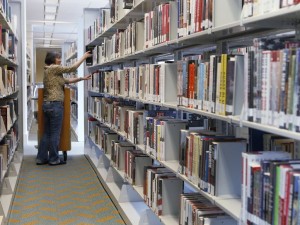Over winter break, I drove a couple of miles down the road to my local library. It’s a beautiful brick building, complete with a fireplace, comfy chairs and most importantly, a huge selection of books. Inside, I was greeted by the usual post of librarians. Despite being occasionally over -zealous about library rules, they mean well. We quickly chatted about school and they asked if I needed help finding anything. I smiled and wandered over to the biographies section.

Local libraries are still crucial to American towns. Even in the age of the Internet, libraries serve as a place for learning, socializing and serving the community. Unfortunately, funding for local libraries is continuously cut to make budgets and citizens often doubt their value in an age of computers.
There are a total of 119,987 libraries in the United States. Of those, 7.5 percent are public and the others are all considered school, academic, government, medical and other topic-specific libraries, according to statistics from the American Library Association.
Last year, 56 percent of Americans over the age of 16 used a library. 40 percent of individuals said they used the library for research, while 36 percent said they used the library to check out books. Interestingly, women are much more likely to check out a book from the library than men are, according to the Pew Research Center’s 2012 study on library usage.
I suppose I fall into that category. I check out almost every book I read for pleasure, and I am not the only one. Americans check out, on average, around eight books per capita and, as of last year, 171.07 million people in the United States have library cards. I have had my library card for almost 15 years, and I don’t plan to stop using it anytime soon.
In addition to books, libraries also allow cardholders to rent movies or music. While Redbox, Netflix and Spotify may be great deals, I guarantee your library is a better one.
In Wantage, N.J., my hometown, the library goes beyond the traditional function of checking out books. To the left of the main library is an open room that serves as a meeting place for several Boy Scout Troops, a few classes on the local wildlife, and coffeehouses organized by the high school.
Additionally, the library offers free computers and wireless Internet access to all cardholders. This allows low-income citizens to file for unemployment and do research to sign up for training or search for job openings. Over 62 percent of public libraries in the United States reported that they were the only source of free computer access in their community and 91 percent of public libraries are currently offering free Internet access, according to the ALA.
I strongly believe that libraries contribute a large amount of good to every community they are a part of. If we do nothing else, simply stop by and have a look around. There is no other place where we can both read books for free and feel like a part of our community.






